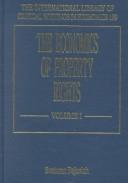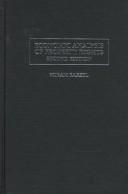| Listing 1 - 10 of 105 | << page >> |
Sort by
|
Book
ISBN: 1503613836 1503614476 1503614484 Year: 2021 Publisher: Stanford, California : Stanford University Press,
Abstract | Keywords | Export | Availability | Bookmark
 Loading...
Loading...Choose an application
- Reference Manager
- EndNote
- RefWorks (Direct export to RefWorks)
This book offers the first critical engagement with the political economy of the Middle East and North Africa. Challenging conventional wisdom on the origins and contemporary dynamics of capitalism in the region, these cutting-edge essays demonstrate how critical political economy can illuminate both historical and contemporary dynamics of the region and contribute to wider political economy debates from the vantage point of the Middle East. Leading scholars, representing several disciplines, contribute both thematic and country-specific analyses. Their writings critically examine major issues in political economy—notably, the mutual constitution of states, markets, and classes; the co-constitution of class, race, gender, and other forms of identity; varying modes of capital accumulation and the legal, political, and cultural forms of their regulation; relations among local, national, and global forms of capital, class, and culture; technopolitics; the role of war in the constitution of states and classes; and practices and cultures of domination and resistance. Visit politicaleconomyproject.org for additional media and learning resources.
Middle East --- Economic conditions. --- Rentier State Theory. --- capitalism. --- civilizing mission. --- class analysis. --- development. --- imperialism. --- neoliberalism. --- oil. --- private property.

ISBN: 1840642327 9781840642322 Year: 2001 Volume: 129 Publisher: Cheltenham Elgar
Abstract | Keywords | Export | Availability | Bookmark
 Loading...
Loading...Choose an application
- Reference Manager
- EndNote
- RefWorks (Direct export to RefWorks)
National wealth --- Law of real property --- Right of property --- #SBIB:35H435 --- #SBIB:33H011 --- #SBIB:33H13 --- Ownership of property --- Private ownership of property, Right of --- Private property, Right of --- Property, Right of --- Property rights --- Right of private ownership of property --- Right of private property --- Right to property --- Civil rights --- Property --- Beleidssectoren: economisch en werkgelegenheidsbeleid --- Economische geschiedenis --- Economische politiek --- Law and legislation --- Right of property.

ISBN: 0198249594 9780198249597 Year: 1988 Publisher: Oxford Clarendon
Abstract | Keywords | Export | Availability | Bookmark
 Loading...
Loading...Choose an application
- Reference Manager
- EndNote
- RefWorks (Direct export to RefWorks)
Law of real property --- Legal theory and methods. Philosophy of law --- Right of property. --- Droit de propriété --- Right of property --- Ownership of property --- Private ownership of property, Right of --- Private property, Right of --- Property, Right of --- Property rights --- Right of private ownership of property --- Right of private property --- Right to property --- Civil rights --- Property --- Law and legislation --- Droit de propriété
Book
ISBN: 353411809X Year: 1992 Publisher: Darmstadt Wissenschaftliche Buchgesellschaft
Abstract | Keywords | Export | Availability | Bookmark
 Loading...
Loading...Choose an application
- Reference Manager
- EndNote
- RefWorks (Direct export to RefWorks)
Property --- Right of property --- Ownership of property --- Private ownership of property, Right of --- Private property, Right of --- Property, Right of --- Property rights --- Right of private ownership of property --- Right of private property --- Right to property --- Civil rights --- Economics --- Possession (Law) --- Things (Law) --- Wealth --- Law and legislation --- Property. --- Right of property. --- Primitive property

ISBN: 0521597137 0521592755 1316046265 0511609396 9780521597135 9780521592758 Year: 1997 Publisher: Cambridge : Cambridge University Press,
Abstract | Keywords | Export | Availability | Bookmark
 Loading...
Loading...Choose an application
- Reference Manager
- EndNote
- RefWorks (Direct export to RefWorks)
This is a study of the way individuals organise the use of resources in order to maximise the value of their economic rights over these resources. Property rights and all forms of organisation result from people's deliberate actions. In the tradition of Coase, this study offers a unified theoretical structure to deal with exchange, rights formation and organisation which traditional economic theory assumes away. A person's economic property rights over an asset are defined here as the person's ability to gain from the asset by direct consumption or by exchange. It is prohibitively costly to measure accurately all assets' attributes; therefore, rights to them are never fully delineated. Property is consequently in danger of appropriation by others. Individuals enhance their rights by such actions as the protection and better delineation of their assets. In this new edition, Professor Barzel introduces the central role of equity capital as a guarantor of the activities of the firm and elaborates on the distinction between economic rights and legal rights.
Property --- Right of property --- 347.23 --- 347.23 Eigendomsrecht --- Eigendomsrecht --- Ownership of property --- Private ownership of property, Right of --- Private property, Right of --- Property, Right of --- Property rights --- Right of private ownership of property --- Right of private property --- Right to property --- Civil rights --- Economics --- Possession (Law) --- Things (Law) --- Wealth --- Law and legislation --- Property. --- Right of property. --- Primitive property --- Business, Economy and Management

ISBN: 3525357931 Year: 1999 Publisher: Göttingen Vandenhoeck und Ruprecht
Abstract | Keywords | Export | Availability | Bookmark
 Loading...
Loading...Choose an application
- Reference Manager
- EndNote
- RefWorks (Direct export to RefWorks)
Property --- -Property --- -Right to property --- -Ownership of property --- Private ownership of property, Right of --- Private property, Right of --- Property, Right of --- Property rights --- Right of private ownership of property --- Right of private property --- Right of property --- Right to property --- Civil rights --- Economics --- Possession (Law) --- Things (Law) --- Wealth --- History --- Law and legislation --- Ownership of property --- Primitive property
Book
ISBN: 0812243927 1283899434 0812207874 Year: 2012 Publisher: Philadelphia : University of Pennsylvania Press,
Abstract | Keywords | Export | Availability | Bookmark
 Loading...
Loading...Choose an application
- Reference Manager
- EndNote
- RefWorks (Direct export to RefWorks)
To improve their well-being, the poor in developing countries have used both collective action through formal and informal groups and property rights to natural resources. Collective Action and Property Rights for Poverty Reduction: Insights from Africa and Asia examines how these two types of institutions, separately and together, influence quality of life and how they can be strengthened to improve the livelihoods of the rural poor.The product of a global research study by the Systemwide Program on Collective Action and Property Rights (CAPRi) of the Consultative Group on International Agricultural Research, this book draws on case studies from East Africa and South and Southeast Asia to investigate how collective action and property rights have contributed to poverty reduction. The book extends the analysis of these institutions beyond their frequently studied role in natural resource management by also examining how they can reduce vulnerability to different types of shocks.Essays in the volume identify opportunities and risks present in the institutions of collective action and property rights. For example, property rights to natural resources can offer a variety of advantages, providing individuals and groups not only with benefits and incomes but also with assets that can counter the negative effects of shocks such as drought, and can make collective action easier. The authors also demonstrate that collective action has the potential to reduce poverty if it includes more vulnerable groups such as women, ethnic minorities, and the very poor. Preventing exclusion of these often-marginalized groups and guaranteeing genuinely inclusive collective action might require special rules and policies. Another danger to the poor is the capture of property rights by elites, which can be the result of privatization and decentralization policies; case studies and analysis identify actions to prevent such elite capture.
Poverty --- Right of property --- Community organization --- Ownership of property --- Private ownership of property, Right of --- Private property, Right of --- Property, Right of --- Property rights --- Right of private ownership of property --- Right of private property --- Right to property --- Civil rights --- Property --- CBOs (Community organization) --- Community-based organizations --- Community councils --- Community life --- Economic aspects --- Law and legislation --- Business. --- Economics. --- Political Science. --- Public Policy.

ISBN: 1107136296 1280430796 0511180667 0511061773 0511204795 0511307624 0511615612 0511070233 9780511061776 9780511615610 9780521820677 0521820677 9780511070235 9786610430796 6610430799 0521820677 9780521603546 0521603544 Year: 2003 Publisher: Cambridge : Cambridge University Press,
Abstract | Keywords | Export | Availability | Bookmark
 Loading...
Loading...Choose an application
- Reference Manager
- EndNote
- RefWorks (Direct export to RefWorks)
This book addresses a puzzle in political economy: why is it that political instability does not necessarily translate into economic stagnation or collapse? In order to address this puzzle, it advances a theory about property rights systems in many less developed countries. In this theory, governments do not have to enforce property rights as a public good. Instead, they may enforce property rights selectively (as a private good), and share the resulting rents with the group of asset holders who are integrated into the government. Focusing on Mexico, this book explains how the property rights system was constructed during the Porfirio Díaz dictatorship (1876-1911) and then explores how this property rights system either survived, or was reconstructed. The result is an analytic economic history of Mexico under both stability and instability, and a generalizable framework about the interaction of political and economic institutions.
Right of property --- Ownership of property --- Private ownership of property, Right of --- Private property, Right of --- Property, Right of --- Property rights --- Right of private ownership of property --- Right of private property --- Right to property --- Civil rights --- Property --- History. --- Law and legislation --- Mexico --- Economic policy. --- Politics and government --- History of Latin America --- anno 1800-1899 --- anno 1900-1999 --- Social Sciences --- Political Science
Book
ISBN: 1107720370 113989420X 1107727650 1107730015 1107731763 1107728258 1107723639 1139035185 9781107723634 1306376327 9781306376327 9781107731769 9781139035187 9781107728257 9781107006454 1107006457 9781107720374 9781107727656 9781107730014 1316621138 Year: 2014 Publisher: Cambridge : Cambridge University Press,
Abstract | Keywords | Export | Availability | Bookmark
 Loading...
Loading...Choose an application
- Reference Manager
- EndNote
- RefWorks (Direct export to RefWorks)
Property Law and Social Morality develops a theory of property that highlights the social construction of obligations that individuals owe each other. By viewing property law through the lens of obligations rather than through the lens of rights, the author affirms the existence of important property rights (when no obligation to another exists) and defines the scope of those rights (when an obligation to another does exist). By describing the scope of the decisions that individuals are permitted to make and the requirements of other-regarding decisions, the author develops a single theory to explain the dynamics of private and common property, including exclusion, nuisance, shared decision making, and decision making over time. The development of social recognition norms adds to our understanding of property evolution, and the principle of equal freedom underlying social recognition that limit government interference with property rights.
Right of property --- Ownership of property --- Private ownership of property, Right of --- Private property, Right of --- Property, Right of --- Property rights --- Right of private ownership of property --- Right of private property --- Right to property --- Civil rights --- Property --- Social aspects. --- Law and legislation --- Law --- General and Others
Book
ISBN: 1107222613 1139365231 1280663758 9786613640680 1139377698 1139374834 0511978545 1139376268 1139370847 1139379127 9781139376266 9781139379120 9781280663758 9780511978548 9780521113656 0521113652 9780521130608 0521130603 9781139374835 Year: 2012 Publisher: Cambridge : Cambridge University Press,
Abstract | Keywords | Export | Availability | Bookmark
 Loading...
Loading...Choose an application
- Reference Manager
- EndNote
- RefWorks (Direct export to RefWorks)
This book surveys the leading modern theories of property - Lockean, libertarian, utilitarian/law-and-economics, personhood, Kantian and human flourishing - and then applies those theories to concrete contexts in which property issues have been especially controversial. These include redistribution, the right to exclude, regulatory takings, eminent domain and intellectual property. The book highlights the Aristotelian human flourishing theory of property, providing the most comprehensive and accessible introduction to that theory to date. The book's goal is neither to cover every conceivable theory nor to discuss every possible facet of the theories covered. Instead, it aims to make the major property theories comprehensible to beginners, without sacrificing accuracy or sophistication. The book will be of particular interest to students seeking an accessible introduction to contemporary theories of property, but even specialists will benefit from the book's lucid descriptions of contemporary debates.
Property. --- Property --- Right of property. --- Ownership of property --- Private ownership of property, Right of --- Private property, Right of --- Property, Right of --- Property rights --- Right of private ownership of property --- Right of private property --- Right of property --- Right to property --- Civil rights --- Economics --- Possession (Law) --- Things (Law) --- Wealth --- Philosophy. --- Law and legislation --- Philosophy --- Primitive property --- Law --- General and Others
| Listing 1 - 10 of 105 | << page >> |
Sort by
|

 Search
Search Feedback
Feedback About
About Help
Help News
News